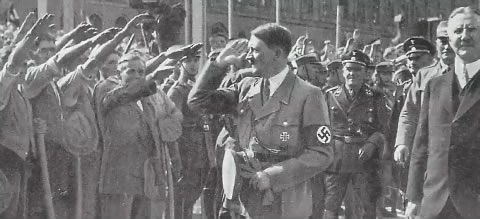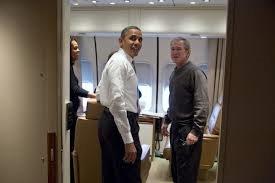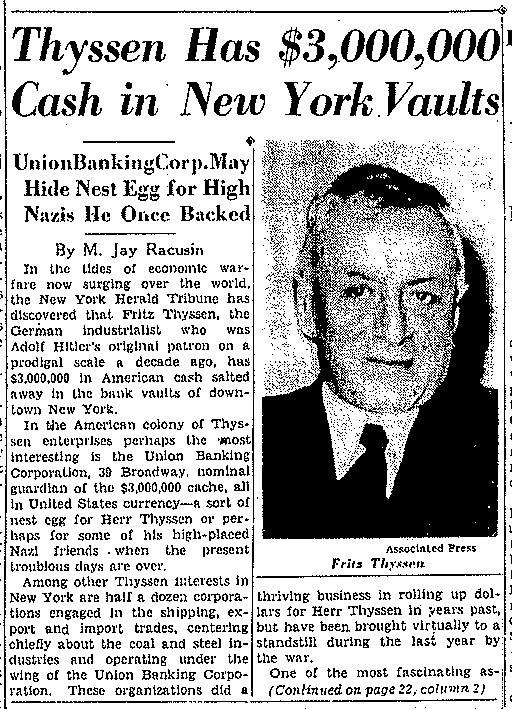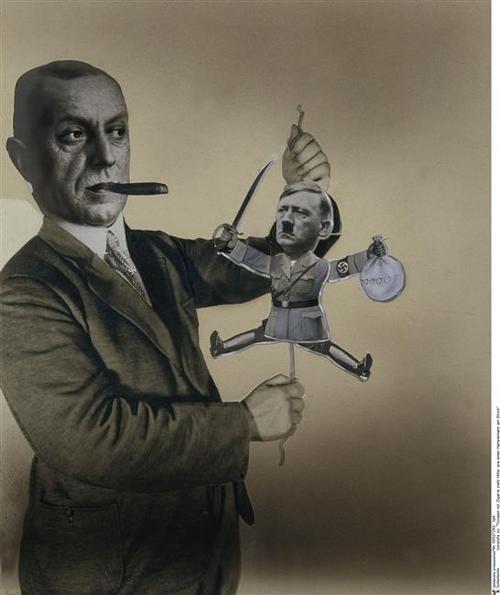This Week in History:
January 26-February 1, 1933
Nazi Regime Begins, Wall Street “Particularly Pleased”
by Anton Chaitkin
January 2014
|
New York Herald Tribune, July 31, 1941, exposing the New York funding apparatus directed by Prescott Bush and others, for Adolf Hitler's takeover of Germany. |
“His arm extended in the Fascist salute, Adolf Hitler stood at a … window of the new German Chancellery answering the ovation of his followers…. Germany in naming Hitler Chancellor has set out upon a new road…. He is in a position to utilize the tremendous enthusiasm of the National Socialist movement for the good of Germany if he can direct it wisely. Among his 12,000,000 supporters there is a vast group of sound citizenry. It is to them, not to the more radical elements of his party, that Chancellor Hitler’s services must be given….” – thus the Christian Science Monitor editorialized January 31, 1933, the day after President Paul von Hindenburg appointed the Nazi as Germany’s head of government. Only four weeks later Nazi agents burned down the German Parliament, and Hitler assumed dictatorial powers to “protect the people” from terrorism.
How had this happened?
How had this happened? In 1931 Hitler fundraiser Fritz Thyssen had brought Hjalmar Schacht, former head of the central bank and a favorite of London and Wall Street, into a drive to install a Nazi regime. In November, 1932, Thyssen, Schacht and their friends wrote to President Hindenburg urging he appoint Hitler Chancellor.
The deed now done, the Christian Science Monitor hinted at nervousness that “radical elements” inside Germany might do something to overturn the Nazi takeover. The Monitor reported (January 31, 1933, page 10), “….The Communist threat of a general strike in Berlin as result of the Nazi cabinet being so bitterly opposed by the more radical elements, was watched in international banking quarters with keen interest. There was a tendency to take an optimistic view, however. Prominent banking quarters in Wall Street were particularly pleased with the prospect of the return of Dr. Schacht as head of the Reichsbank.”
 Adolph Hitler returns the salute. Far right: Hitler's finance minister Hjalmar Schacht.
|
|
1933 cartoon-photmontage, Thyssen playing with his puppet Hitler. |
Let us inquire, precisely who were the “prominent banking quarters in Wall Street” that were “particularly pleased” at this chilling turn of events?
A partial clarification appeared in the New York press eight years later, the result of some digging by Herald Tribune investigative reporter M. Jay Racusin. A front page article (“Thyssen Has $3,000,000 Cash in New York Vaults,” July 31, 1941) stated that “Fritz Thyssen, the German industrialist who was Adolf Hitler’s original patron” had for many years had millions of dollars “salted away” in the Union Banking Corporation in downtown New York, a sub-unit of the world’s largest investment banking firm, Brown Brothers Harriman. Racusin had gotten a copy of a letter written by a Brown Brothers Harriman representative to the New York state banking authorities, asking whether the firm’s partners – Prescott Bush and three others -- should resign from the board of Union Banking since the United States might soon enter the war then raging in Europe. After breaking this story, Racusin was nominated for a Pulitzer prize that year.
Union Banking Corporation
The bankers’ letter explained that Averell Harriman had met Fritz Thyssen in Germany in 1925 (Thyssen had already funded Hitler’s 1923 attempted takeover of Germany). Harriman had set up a New York “bank” for Thyssen (Union Banking) and had put his partners, Bush and others, on the board.
Union Banking Corp. served from then until the 1940s as an “offshore” cash and gold transfer agency for Thyssen, under the supervision of Prescott Bush and his father-in-law, George Herbert Walker.
In 1930 Thyssen used money from offshore accounts to install the Nazi party in new headquarters, the Brown House. In 1931 W. A. Harriman and Co, merged with the Anglo-American firm, Brown Brothers, whose former partner Montagu Norman was the Bank of England’s Governor and Hitler’s leading British sponsor. From then until Hitler took power, Union Banking Corp. (whose only client was Thyssen) bought $8 million in gold and, in concert with Morgan interests and Montagu Norman, shipped gold and cash back and forth between New York and Germany. For the crucial 1932 German election, $3,000,000 was transferred into the Nazi Party through a Thyssen donation.
 Wikimedia Commons..
Left: Barack Obama; right: George W. Bush. |
After the U.S. entered World War II, President Franklin Roosevelt’s administration cracked down under the Trading With the Enemy Act. In 1942 they seized the Union Banking shares of Prescott Bush and the other Harriman partners, along with their shares in many German enterprises -- industrial, armaments, transport and utilities -- jointly controlled by the Hitler regime and Brown Brothers Harriman.
Prescott Bush’s son George Herbert Walker Bush, then 18 years old, was later the 41st U.S. President who partnered with the British to invade Iraq. Prescott’s grandson George Walker Bush was the 43rd President who began the Anglo-American War on Terror, the domestic spying and the catastrophic overseas wars that continue today under Barack Obama.
(For complete background, see Anton Chaitkin and Webster Tarpley, George Bush: The Unauthorized Biography, published 1992 by Executive Intelligence Review.)


